Fleurs du Mal Magazine


Or see the index
VPRO BOEKEN
Tineke Cleiren & Theodor Holman
Zondag 10 maart 2013 om 11.20 uur op Nederland 1
Tineke Cleiren en Antoine Hol: Strafrecht, tussen ratio en emotie
De Leidse hoogleraar strafrecht Tineke Cleiren schreef samen met haar man Antoine Hol, eveneens jurist, eveneens hoogleraar, het boek Strafrecht, tussen ratio en emotie. Het werd een boek waarin Cleiren uitlegt wat recht eigenlijk is, waar het voor staat en waar op dit moment in onze samenleving de knelpunten zitten.
Strafrecht, tussen ratio en emotie is een boek geworden dat uitlegt dat een goed functionerend strafrecht laveert tussen ratio en emotie, in plaats van een van die twee kanten te kiezen. Het beantwoordt vragen over eigenrichting, slachtofferschap, vergelding, verwerking en volksgerichten. Bijvoorbeeld legt het uit dat Officieren van Justitie niet alleen maar ‘crimefighters’ zijn die zorgen voor belastend bewijsmateriaal, maar dat ze ook voor ontlastend materiaal moeten zorgen. Alle denkbare paden moeten gevolgd worden, en aan iedere zaak zitten twee kanten. Hoe dit in de praktijk werkt, legt Cleiren zondag uit.
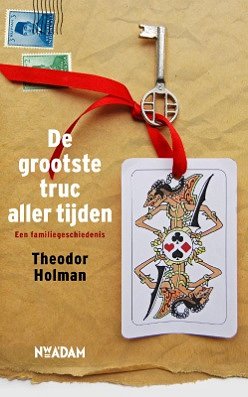
Theodor Holman: De grootste truc aller tijden
Schrijver Theodor Holman wist vrijwel niets van de Tweede Wereldoorlog in Nederlands-Indië. Daar kwam hij achter toen hij twee jaar geleden een redevoering hield bij een herdenking. Zijn ouders en zijn zus zaten in een jappenkamp, maar zijn ouders konden de woorden niet vinden om er goed over te vertellen en de jonge Theodor sloot zich af voor de verhalen. Nu maakt hij het goed, met De grootste truc aller tijden schreef hij een Indische familiegeschiedenis.
In de nalatenschap van zijn ouders vond hij het kampdagboek van zijn vader. Een klein, beduimeld boekje van pakpapier waarin zijn vader in priegelig handschrift zijn belevenissen aan de Birma-spoorlijn neerschreef. Achterin het boekje had zijn vader, die een niet onverdienstelijk goochelaar was, alle kaarttrucs die hij kende opgeschreven. De schrijver had zijn invalshoek gevonden en vertelt aanstaande zondag over zijn nieuwe boek, dat gaat over de ‘illusies die het leven ons flikt’.
Meer informatie op website: ≡ VPRO BOEKEN
fleursdumal.nl magazine
More in: Archive C-D, Archive G-H, The talk of the town
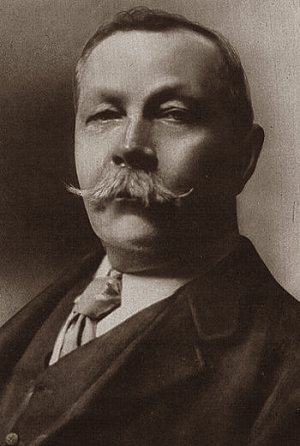
Arthur Conan Doyle
(1859-1930)
Advice to a young author
First begin
Taking in.
Cargo stored,
All aboard,
Think about
Giving out.
Empty ship,
Useless trip!
Never strain
Weary brain,
Hardly fit,
Wait a bit!
After rest
Comes the best.
Sitting still,
Let it fill;
Never press;
Nerve stress
Always shows.
Nature knows.
Critics kind,
Never mind!
Critics flatter,
No matter!
Critics curse,
None the worse.
Critics blame,
All the same!
Do your best.
Hang the rest!
Arthur Conan Doyle poetry
kempis.nl poetry magazine
More in: Archive C-D, Arthur Conan Doyle, Doyle, Arthur Conan
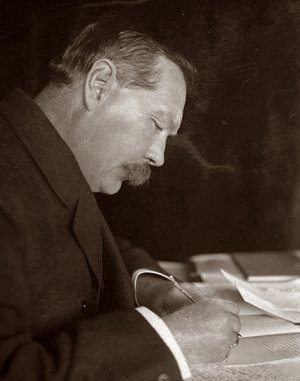
Arthur Conan Doyle
(1859-1930)
Religio Medici
1
God’s own best will bide the test,
And God’s own worst will fall;
But, best or worst or last or first,
He ordereth it all.
2
For all is good, if understood,
(Ah, could we understand!)
And right and ill are tools of skill
Held in His either hand.
3
The harlot and the anchorite,
The martyr and the rake,
Deftly He fashions each aright,
Its vital part to take.
4
Wisdom He makes to form the fruit
Where the high blossoms be;
And Lust to kill the weaker shoot,
And Drink to trim the tree.
5
And Holiness that so the bole
Be solid at the core;
And Plague and Fever, that the whole
Be changing evermore.
6
He strews the microbes in the lung,
The blood-clot in the brain;
With test and test He picks the best,
Then tests them once again.
7
He tests the body and the mind,
He rings them o’er and o’er;
And if they crack, He throws them back,
And fashions them once more.
8
He chokes the infant throat with slime,
He sets the ferment free;
He builds the tiny tube of lime
That blocks the artery.
9
He lets the youthful dreamer store
Great projects in his brain,
Until He drops the fungus spore
That smears them out again.
10
He stores the milk that feeds the babe,
He dulls the tortured nerve;
He gives a hundred joys of sense
Where few or none might serve.
11
And still He trains the branch of good
Where the high blossoms be,
And wieldeth still the shears of ill
To prune and prime His tree.
Arthur Conan Doyle poetry
kempis.nl poetry magazine
More in: Archive C-D, Arthur Conan Doyle, Doyle, Arthur Conan
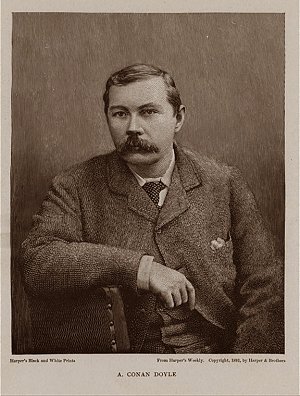
Arthur Conan Doyle
(1859-1930)
Haig is moving
August 1918
Haig is moving!
Three plain words are all that matter,
Mid the gossip and the chatter,
Hopes in speeches, fears in papers,
Pessimistic froth and vapours–
Haig is moving!
Haig is moving!
We can turn from German scheming,
From humanitarian dreaming,
From assertions, contradictions,
Twisted facts and solemn fictions–
Haig is moving!
Haig is moving!
All the weary idle phrases,
Empty blamings, empty praises,
Here’s an end to their recital,
There is only one thing vital–
Haig is moving!
Haig is moving!
He is moving, he is gaining,
And the whole hushed world is straining,
Straining, yearning, for the vision
Of the doom and the decision–
Haig is moving!
Arthur Conan Doyle poetry
kempis.nl poetry magazine
More in: *War Poetry Archive, Archive C-D, Arthur Conan Doyle, Doyle, Arthur Conan

Arthur Conan Doyle
(1859-1930)
The Bigot
The foolish Roan fondly thought
That gods must be the same to all,
Each alien idol might be brought
Within their broad Pantheon Hall.
The vision of a jealous Jove
Was far above their feeble ken;
They had no Lord who gave them love,
But scowled upon all other men.
But in our dispensation bright,
What noble progress have we made!
We know that we are in the light,
And outer races in the shade.
Our kindly creed ensures us this–
That Turk and infidel and Jew
Are safely banished from the bliss
That’s guaranteed to me and you.
The Roman mother understood
That, if the babe upon her breast
Untimely died, the gods were good,
And the child’s welfare manifest.
With tender guides the soul would go
And there, in some Elysian bower,
The tiny bud plucked here below
Would ripen to the perfect flower.
Poor simpleton! Our faith makes plain
That, if no blest baptismal word
Has cleared the babe, it bears the stain
Which faithless Adam had incurred.
How philosophical an aim!
How wise and well-conceived a plan
Which holds the new-born babe to blame
For all the sins of early man!
Nay, speak not of its tender grace,
But hearken to our dogma wise:
Guilt lies behind that dimpled face,
And sin looks out from gentle eyes.
Quick, quick, the water and the bowl!
Quick with the words that lift the load!
Oh, hasten, ere that tiny soul
Shall pay the debt old Adam owed!
The Roman thought the souls that erred
Would linger in some nether gloom,
But somewhere, sometime, would be spared
To find some peace beyond the tomb.
In those dark halls, enshadowed, vast,
They flitted ever, sad and thin,
Mourning the unforgotten past
Until they shed the taint of sin.
And Pluto brooded over all
Within that land of night and fear,
Enthroned in some dark Judgment Hall,
A god himself, reserved, austere.
How thin and colourless and tame!
Compare our nobler scheme with it,
The howling souls, the leaping flame,
And all the tortures of the pit!
Foolish half-hearted Roman hell!
To us is left the higher thought
Of that eternal torture cell
Whereto the sinner shall be brought.
Out with the thought that God could share
Our weak relenting pity sense,
Or ever condescend to spare
The wretch who gave Him just offence!
‘Tis just ten thousand years ago
Since the vile sinner left his clay,
And yet no pity can he know,
For as he lies in hell to-day
So when ten thousand years have run
Still shall he lie in endless night.
O God of Love! O Holy One!
Have we not read Thy ways aright?
The godly man in heaven shall dwell,
And live in joy before the throne,
Though somewhere down in nether hell
His wife or children writhe and groan.
From his bright Empyrean height
He sees the reek from that abyss–
What Pagan ever dreamed a sight
So holy and sublime as this!
Poor foolish folk! Had they begun
To weigh the myths that they professed,
One hour of reason and each one
Would surely stand a fraud confessed.
Pretending to believe each deed
Of Theseus or of Hercules,
With fairy tales of Ganymede,
And gods of rocks and gods of trees!
No, no, had they our purer light
They would have learned some saner tale
Of Balaam’s ass, or Samson’s might,
Or prophet Jonah and his whale,
Of talking serpents and their ways,
Through which our foolish parents strayed,
And how there passed three nights and days
Before the sun or moon was made!
· · · ·
O Bigotry, you crowning sin!
All evil that a man can do
Has earthly bounds, nor can begin
To match the mischief done by you–
You, who would force the source of love
To play your small sectarian part,
And mould the mercy from above
To fit your own contracted heart.
Arthur Conan Doyle poetry
kempis.nl poetry magazine
More in: Archive C-D, Arthur Conan Doyle, Doyle, Arthur Conan
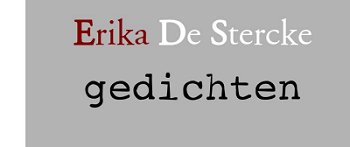
Eindpunt
De trein stopt bij elk station
een lange rit
ik lees wat, dommel in, schrijf iets op
denk aan mijn moeder hoe ze alleen
in het bed ligt, ze slaapt wellicht
De trein schokt bij elk vertrek
alles kan veranderen, weet ik
zelfs de uren blijven niet klokvast
ik kijk naar buiten, naar een zwart vlak
geen contouren, geen schakeringen
gewoon donker
de nacht heeft een andere stem dan overdag
mijn woorden komen onvast in een boekje
ze dansen grillig, gisteren nog niet
ik voel aan mijn schouder, een pijnlijke trek
de koude hangt rond de spieren, slecht
morgen neem ik een bad, schrob mijn huid rood
wrijf ze in met olie
dan eet ik een uitgebreid ontbijt met eieren
wandel in de stad
koffie met taart, een tweede koffie zonder taart
‘s avonds een paar glazen wijn
om het alleen zijn te verdoezelen
de toekomst te verdoven
mama, ben ik er nog niet ?
Erica De Stercke
fleursdumal.nl magazine
More in: Archive C-D, De Stercke, Erika
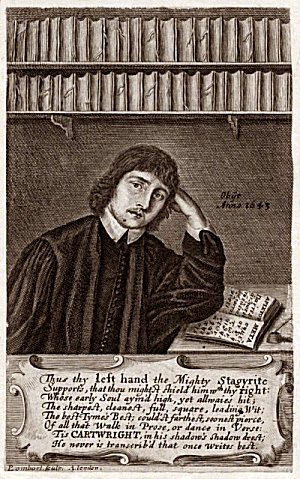
William Cartwright
(1611-1643)
ON A VIRTUOUS YOUNG GENTLEWOMAN
THAT DIED SUDDENLY
HE who to Heaven more Heaven doth annex,
Whose lowest thought was above all our sex,
Accounted nothing death but t’ be reprieved,
And died as free from sickness as she lived.
Others are dragg’d away, or must be driven,
She only saw her time and stept to Heaven;
Where seraphims view all her glories o’er,
As one return’d that had been there before.
For while she did this lower world adorn,
Her body seem’d rather assumed than born;
So rarified, advanced, so pure and whole,
That body might have been another’s soul;
And equally a miracle it were
That she could die, or that she could live here.
William Cartwright poetry
kempis.nl poetry magazine
More in: Archive C-D
Johnny van Doorn
‘Johnny the Selfkicker’
(1944 – 1991)
Komtocheensklaarklootzak
Mijn kamer verhuurd
Voor een uur of 2
Aan enkele verstok-
Te voyeurs:
Een gat in de
Vloer geeft een
Luxueus uitzicht
Op het onderliggend
Temeiersbed &
Bij iedere seance
Kreunt mijn
Krolse kat
Luidruchtig mee &
Via een snelle
Knopindruk golft
De (van een bedrijft-
Tape afkomstige)
Mededeling-Kom
Toch Eens
Klaar Klootzak-
Door het met
Rococomeubelen
Ingerichte
Naaivertrek &
Tot zieleheil
Van mijn somber
Herfstig wezen
Herstel ik het
Schiet- en avondgebed
In ere &
Iedere nacht
(Tussen haar billen
Ingevouwen)
Spreek ik tot de Goede God
Johnny van Doorn (Johnny the Selfkicker) poetry
kempis.nl poetry magazine
More in: Archive C-D
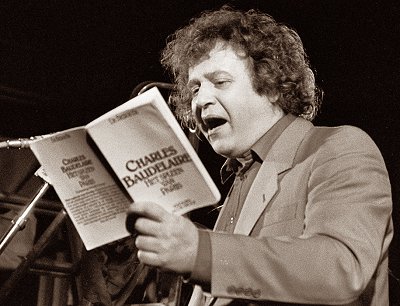
Photo credit: © René Alphenaar- All rights reserved
Johnny van Doorn
‘Johnny the Selfkicker’
(1944 – 1991)
Dendermonde 63
Voor een Vlaams cultureel café
Waar ik een expositie zal openen,
Wordt ons Volkswagenbusje met
Minstens 25 inzittenden door
De plaatselijke Wouten tot
Staan gebracht & in de tussen-
Tijd dat er rechtsomkeert
Naar het bureau wordt gereden
Wordt de nu gevaarlijke Pot
Door alle aanwezigen snel
Verorberd of in de bilspleet
Gestopt. Triomfantelijk wordt
Met ons de hoofdverdachte
(ivm 5 kilo Marihu -dat is tijm,
Stramonium, laurier etcetc)
Aan fouillering en verhoor
Onderworpen. Op de vraag hoe
Ik wel heten mag, antwoord ik
Johnny the Selfkicker &
Spijtig betreurt men dat
The Electronic Jezus (dat ben ik ook!)
Niet aanwezig is &
De oerdomme vertoning zet
Zich voort: als men mijn zakken
Beklopt roep ik schertsend Kijk
Voor De Zekerheid Eens In M’n
Tokus (plat Vlaams voor kont) &
Een deskundige uit Brussel
Wordt opgebeld om snel per taxi
Over te komen & men toont hem
Meteen bij aankomst een gevonden
Stukje kattebrood (dat hij
Gewichtig met een heetgemaakt
Zakmesje onderzoekt):
Waarbij hij verrast constateert
Mijne Heren Dit Is De Befaamde Hasjies!!
Johnny van Doorn (Johnny the Selfkicker) poetry
kempis.nl poetry magazine
More in: Archive C-D

Lewis Carroll
(1832 — 1898)
Echoes
Lady Clara Vere de Vere
Was eight years old, she said:
Every ringlet, lightly shaken, ran itself in golden thread.
She took her little porringer:
Of me she shall not win renown:
For the baseness of its nature shall have strength to drag her
down.
“Sisters and brothers, little Maid?
There stands the Inspector at thy door:
Like a dog, he hunts for boys who know not two and two are four.”
“Kind words are more than coronets,”
She said, and wondering looked at me:
“It is the dead unhappy night, and I must hurry home to tea.”
Lewis Carroll poetry
kempis.nl poetry magazine
More in: Archive C-D, Carroll, Lewis
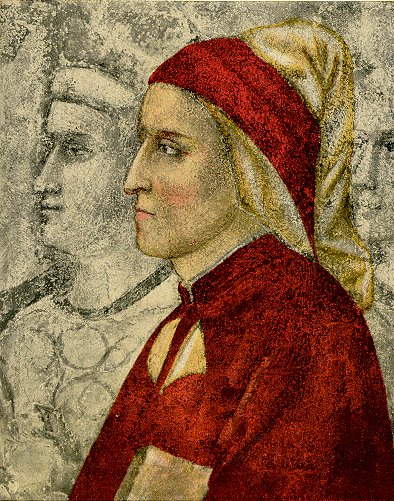
Dante Alighieri
(1265-1321)
Death, always cruel
Eath, always cruel, Pity’s foe in chief,
Mother who brought forth grief,
Merciless judgment and without appeal!
Since thou alone hast made my heart to feel
This sadness and unweal,
My tongue upbraideth thee without relief.
And now (for I must rid thy name of ruth)
Behoves me speak the truth
Touching thy cruelty and wickedness:
Not that they be not known; but ne’ertheless
I would give hate more stress
With them that feed on love in very sooth.
Out of this world thou hast driven courtesy,
And virtue, dearly prized in womanhood;
And out of youth’s gay mood
The lovely lightness is quite gone through thee.
Whom now I mourn, no man shall learn from me
Save by the measure of these praises given.
Whoso deserves not Heaven
May never hope to have her company.
“Death, always cruel” was translated into English by D.G. Rossetti (1828-1882)
Dante Alighieri poetry
kempis.nl poetry magazine
More in: Archive C-D, Dante Alighieri, Rossetti, Dante Gabriel
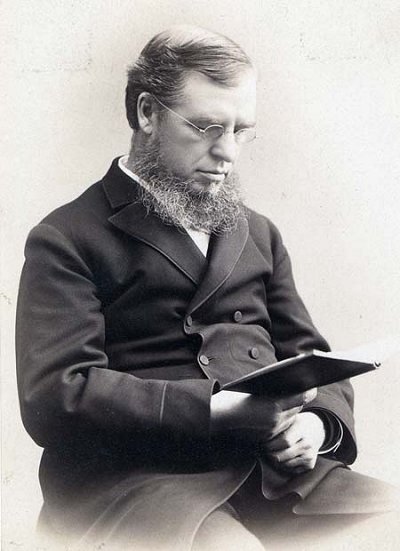
John White Chadwick
(1840-1904)
The hardest lot
O look upon the face of a dead friend
Is hard; but ’tis not more than we can bear
If, haply, we can see peace written there,–
Peace after pain, and welcome so the end,
Whate’er the past, whatever death may send.
Yea, and that face a gracious smile may wear,
If love till death was perfect, sweet, and fair;
But there is woe from which may God defend:
To look upon our friendship lying dead,
While we live on, and eat, and drink, and sleep–
Mere bodies from which all the soul has fled–
And that dead thing year after year to keep
Locked in cold silence in its dreamless bed:–
There must be hell while there is such a deep.
“The Hardest Lot” is reprinted from American Sonnets. Ed. William Sharp. London: Walter Scott, 1889
John White Chadwick poetry
kempis.nl poetry magazine
More in: Archive C-D
Thank you for reading Fleurs du Mal - magazine for art & literature